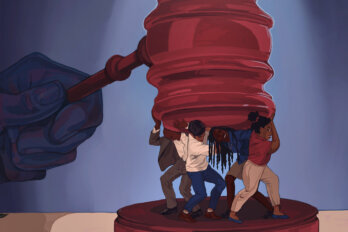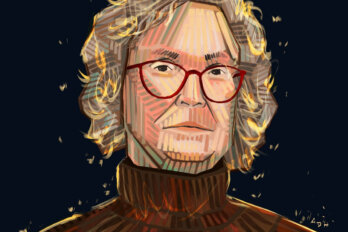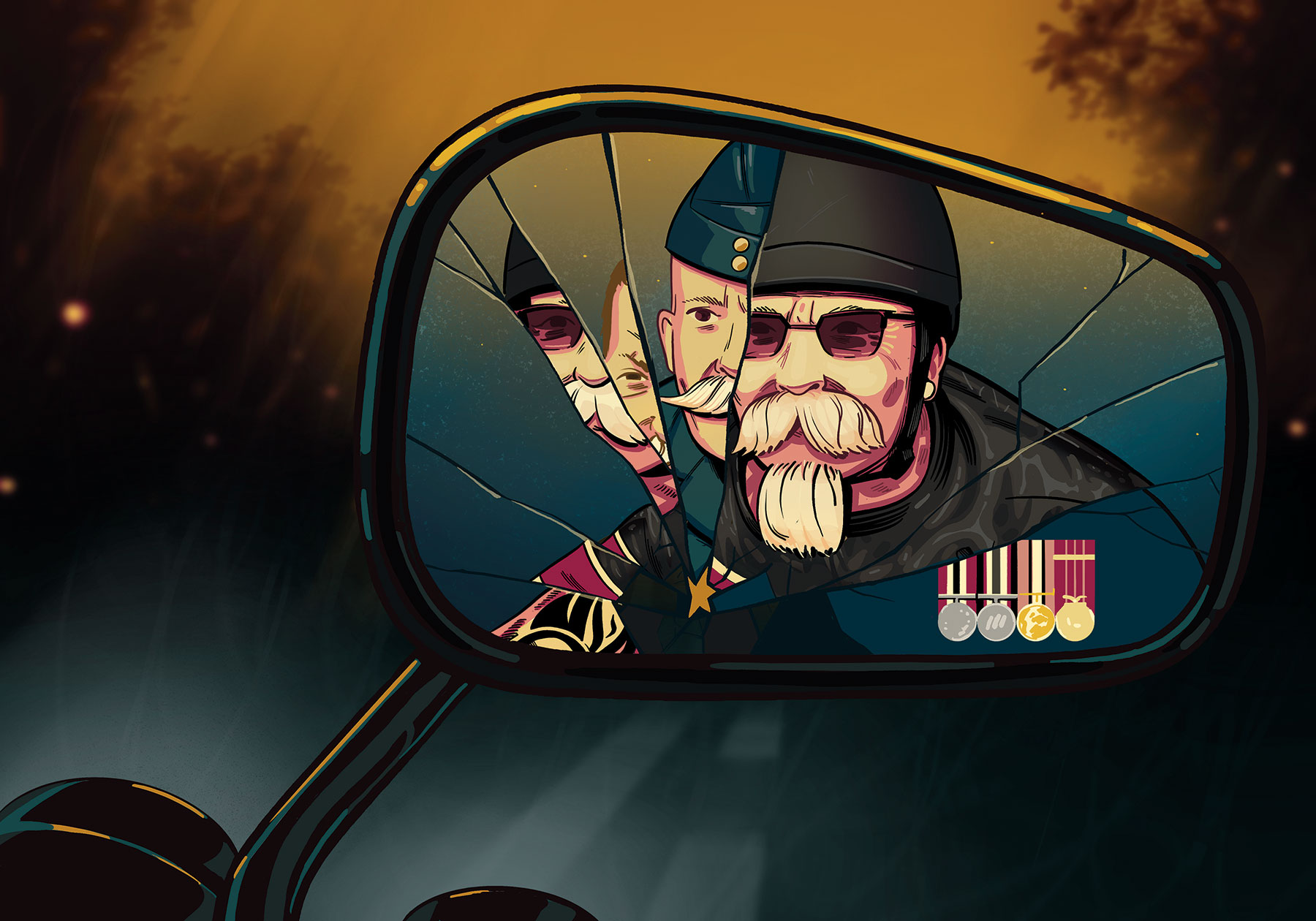
MEMOIR / JANUARY/FEBRUARY 2025
The Military Gave My Brother Purpose. It Also Broke Him
As Joe progressed through the ranks, he started living two lives: the lauded soldier and the closet alcoholic
BY LISA GREGOIRE
ILLUSTRATION BY STEVEN P. HUGHES
Published 6:30, NOV. 11, 2024

This article contains discussions of suicide. If you or someone you know is having a suicide crisis, please call Talk Suicide Canada (1-833-456-4566). There is also the Hope for Wellness Helpline for Indigenous people across Canada (1-855-242-3310).
When my big brother Joe died two years ago at age sixty-three, alone on his bedroom floor in Greenwood, Nova Scotia, he had more than sixty tattoos on his body but no teeth. Years of anxious clenching and grinding had left his molars so cracked and painful that, in desperation, he’d had all his teeth removed in favour of dentures. He died before the new teeth arrived. He died before his next tattoo, which, according to his day planner, was scheduled for two days after the funeral. “I called the artist to tell him about my dad, and he was shocked,” Joe’s daughter, Angela, told me. “I said, ‘Let’s keep the appointment. I’ll get whatever he was going to get.’ The guy pulled up the email thread with dad and said it was the number on the nose of the jet he flew—938. I was so relieved it wasn’t a naked woman.”
To be clear, Joe was no pilot, though it had been his childhood dream to become one. Knowing this, a friend had taken him flying once and let him take the co-pilot’s controls for a few minutes. Angela and her brother, Steven, know this story well. Both got “938” tattooed on their inner biceps. You see it when they clasp hands behind their heads and lean back, like Joe often did. A 2015 psychological assessment report that led to my brother’s post-traumatic stress disorder diagnosis noted, “Overall, Mr. Gregoire is in very poor condition with persistent psychological symptoms. . . . He goes for tattoos regularly, up to monthly. . . . He acknowledges that there is an urge for pain release.”
Joe’s tattoo artist cancelled his other appointments the day of “938” to respect the kids’ grief, and he refused to take their money. There were a couple young people at Joe’s funeral who looked like tattoo artists, and I wish I’d hugged them and thanked them for helping my brother.
The night before the funeral, I visited Joe’s house with my niece and nephew. Joe had been on a bender by the looks of it: empty vodka mickeys, dried vomit, toppled furniture. I tiptoed around like a thief, scenes of a joyful visit nine months prior flashing in my head like a digital glitch. It was hard to reconcile that with this. I didn’t know where to look. I kept holding my breath. The kids were resigned. They’d seen Joe’s benders before—seen more than they ought to have.
Joe was a skilled ex-soldier with thirty-four years of service. About 100 people attended his funeral in August 2022, half of them bikers who arrived at the Middleton Funeral Home in a rumbling chrome convoy, with Steven leading on his dad’s blue Harley. Some bikers had military medals pinned to leather. They wept and hugged one another, and us, and later, over cold cuts and soft drinks, told stories of my brother’s notorious humour and generosity. So deep were Joe’s needs that sometimes he accused people who loved him of not loving him enough. In his final years in Nova Scotia, he often complained of being abandoned. But these guys used to knock on his door and keep him sober with plans to ride the rolling Annapolis Valley. Truth for an addict is whatever they need it to be. Joe wanted us to pity him or maybe to forgive the hateful things he sometimes said or did when intoxicated. Or to forget that his isolation was self-imposed.
The medical examiner’s report noted fatty metamorphosis of the liver, an early indicator of cirrhosis, and Joe was positive for THC, amphetamines, and ethanol, a by-product of alcohol consumption. But the official cause of death was plaque buildup in the arteries of the heart. This was a surprise to the family and might have been to him. We knew he had a broken heart, but we didn’t think it was from disease. Oddly, the report’s findings brought a tiny consolation to some of us, since it meant he didn’t choose to die. We had been haunted by hope that he’d one day stop drinking, and by fear that he couldn’t. In those final years, we convulsed with emotions—impatience, tenderness, disappointment, guilt. We took turns bailing out a boat full of holes, Joe grabbing a pail when he could. Sometimes he’d be alone, sinking, and I’d step onto stable ground to save myself. We took turns doing that too.
Is this a story about failure? Sure. Ours to keep him alive. His to stay sober, to be a responsible father, son, brother, and grandpa. But failing repeatedly requires trying repeatedly. Despite the shame of disappointing people for years, Joe kept stumbling around the ring. My brother had traumatic memories from the Canadian Armed Forces, but the positive stuff became part of him too—the honour and courage. Joe lived for it, literally. When he would turn to suicidal ideation, what often saved him was his belief that ending your life was not “honourable.” The military gave Joe purpose and confidence; it found uses for his mechanical expertise and leadership skills; it gave him proof, through copious praise and regular promotions, that he was worthy. It broke him in half sometimes but, holy shit, it kept him alive too.
After Joe died, I gathered a box of his personal papers from the house. With permission from my niece and nephew, I read binders of military commendations and certificates lovingly stored in plastic sleeves; I read psychological assessments and journals. He’d been an outstanding soldier, with a peacekeeping tour in Egypt. And he’d been an alcoholic. Those two things can coexist.
Joe was born September 12, 1958, in what was then Canadian Forces Base Chatham, New Brunswick. He was the first son after two daughters and was followed by two more boys and a girl: me. My mom came from Irish ancestors and my dad from Québécois French, so we spent a lot of time on our knees in church or facing a corner when we misbehaved.
My parents were born into working-class poverty. Dad was underage when he joined the army, at seventeen. His trade was MSE Op: mobile support equipment operator. That means he drove vehicles, taught others how to drive vehicles, and eventually managed fleets of vehicles and personnel. Despite not finishing high school, he advanced to chief warrant officer, the highest rank for a non-commissioned officer.
My dad was a generous provider. He never drank after work like other military dads did, and he rarely spent a nickel on himself. But he demanded obedience, especially from my brothers. Joe, as the eldest boy, suffered regular blows and shouted reprimands, likely designed to make him a respectable man. My older sisters had moved out by then, and we young ones would hide in our bedrooms when the shouting started, fearing for Joe and ourselves. My dad is ninety-three now. He told me recently he regrets being so hard on Joe. “I should have told him so,” he said, breath catching in his throat. “I wonder if that would have made a difference.”
Joe was eight years older than me, with a round Irish face, red-blonde hair, and freckles. What I remember of him is his generosity, motorcycles, and unpredictable mood swings. Joe used to rock himself to sleep as a teenager, sometimes so aggressively the bed would move across the room and bar the door when my mother came to wake him in the morning. My mom told me once Joe had always needed “a little extra attention.” She said he was sensitive, emotional, and “liked to have things in order.” I wonder if that was how they described kids who may have had mental health challenges. He was never diagnosed with anything back then, but fifty years ago, parents didn’t regularly seek mental health assessments or therapy for kids like they do now.
Joe failed a grade and was also put back one, so that, by middle school, he was a couple of years behind his peers. Teachers made him chop wood, empty ashtrays, and kill bats. They slapped him on the back of the head to get his attention. “Don’t remember learning anything,” he wrote in a journal he kept later in life for his psychologist. When Joe finally got to high school, he discovered wood shop and auto shop and practically ran both. How relieved he must have felt to finally be good at something.
Joe followed in my dad’s footsteps, joining the Reserves at age seventeen and choosing the same trade, MSE Op. The drinking started then, as a teen reservist in training. Everyone drank in the military, or so it appeared to Joe. He watched hungover men teach hungover teenagers how to drive big trucks and shoot guns. “At an early age, I learned to keep my mouth shut and get the job done,” he wrote in 2015 as part of a chronology of events for a PTSD assessment. “Being a person with morals, knowing right from wrong, it drove me crazy watching it.”
After high school, Joe did two stints with the Reserves in Lahr, Germany. What I remember about those trips was him returning like Santa Claus, with a green duffel bag bursting with gifts for everyone. What Joe remembers, according to that chronology of events, is day drinking, his superiors driving drunk, feeling anxious in a foreign country, and getting his jaw broken in a bar by another CAF member.
In her book Unbroken Brain: A Revolutionary New Way of Understanding Addiction, Maia Szalavitz describes addiction as a learning disorder—a dysfunctional coping mechanism which usually develops in adolescence when a young person is at odds with the world. “At least half of people with addictions also have another condition like depression, anxiety disorders, bipolar, ADHD and schizophrenia with some studies finding rates of co-occurring disorders as high as 98%,” Szalavitz writes. “Addictive behaviour is often a search for safety rather than an attempt to rebel or a selfish turn inward.”
Adolescence, normally defined as starting in puberty and ending around twenty, is one of two times, infancy being the other, when the human brain is most “plastic,” undergoing rapid and fundamental learning and adaptation. It’s a pivotal time when humans figure out how to survive, Szalavitz writes. Once those key behaviours are learned, they become almost indelible. “The strong drives that these systems create can be useful when they spur persistence in love, work and parenting.” But when these almost-indelible behaviours involve drugs, alcohol, or other unhealthy ways of coping, they can become not just debilitating in adulthood but complicated to unlearn.
Joe became a full CAF member in 1979. He told us many stories of his life in the military. Here’s one: in the early 1980s, he did a five-month deployment with the navy in the South Pacific, and sailors don’t always take kindly to soldiers. In his PTSD chronology, he wrote about a hazing where he was locked in shackles in the sun while sailors took turns rubbing rotten garbage in his beard. He described sailors getting drunk, shooting sharks, and throwing garbage overboard. Beer was served at lunch. “If you could drink fast you could get 3 or 4 down,” he wrote.
The newspaper from his Canadian Forces base in Ottawa named him the “Base Personality of the Month” when he returned. “Cpl. Gregoire’s adventure [in the navy] was a unique and rewarding experience for him and should serve to show others that there are still opportunities for excitement and travel in the CF,” the story said, “if one is diligent and hard working.”
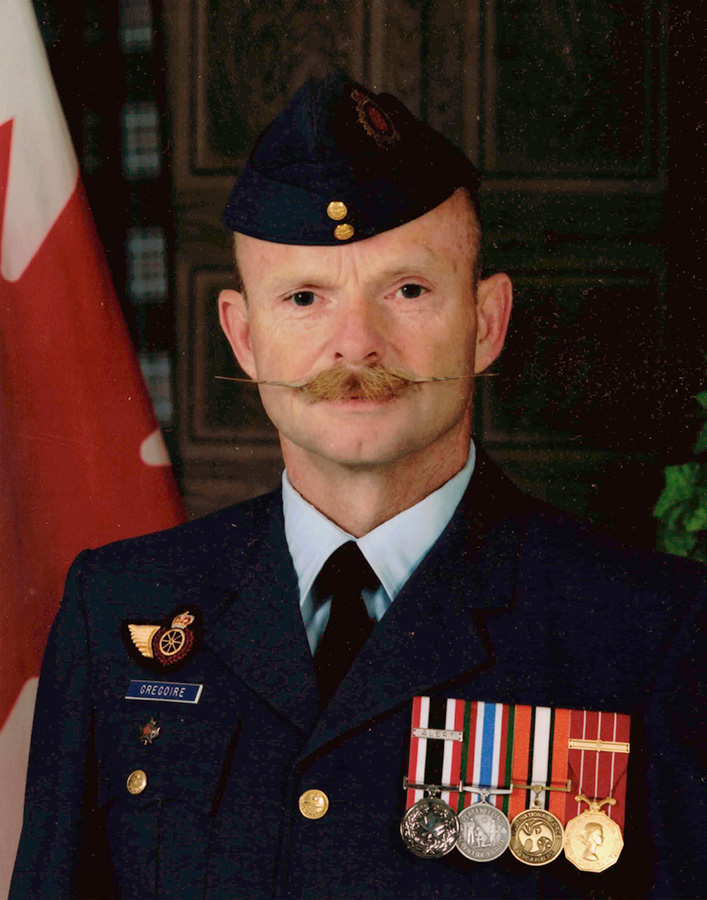
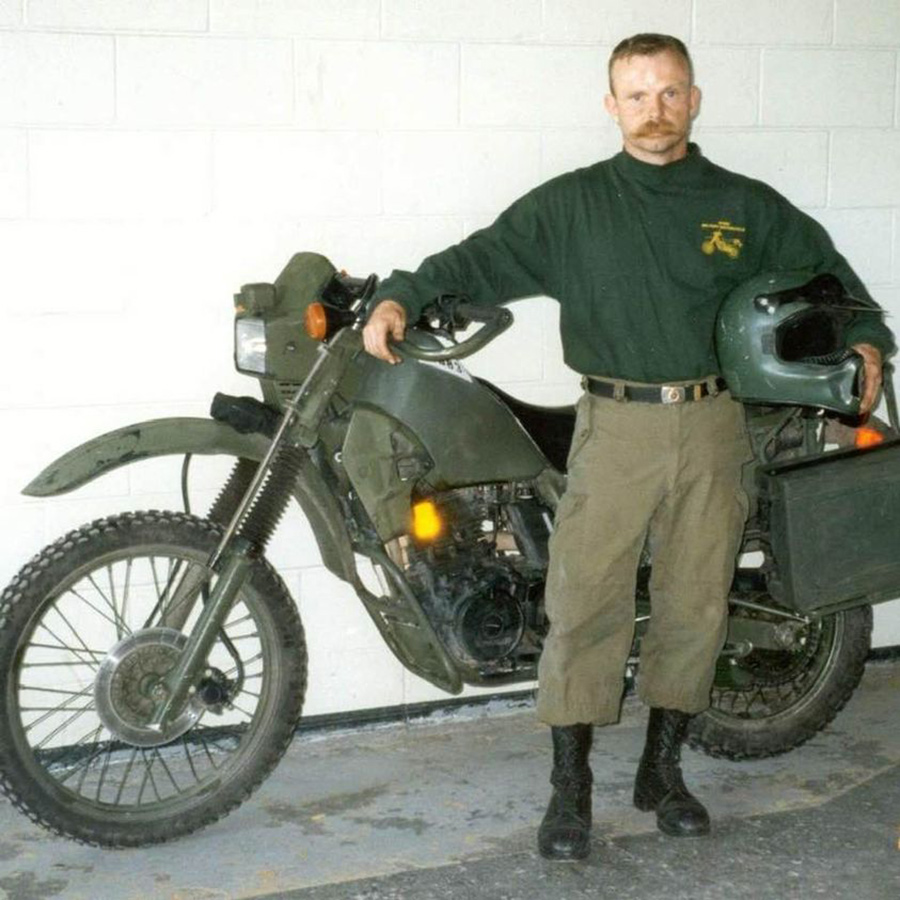
Joe made lifelong friends and had proud moments during his time in the CAF: a tour in the High Arctic at Canadian Forces Station Alert on Ellesmere Island; three years as a junior leadership instructor at the air force academy at CFB Borden in Ontario; parachuting out of airplanes in his spare time as a hobby. But as he progressed through the ranks, he struggled to reconcile the honour and valour the organization professed to embody—the parts he cherished—with some of the negative experiences. He started living two lives: the lauded soldier and the closet alcoholic. Joe was always a heavy drinker, my brothers tell me, with regular bouts of quitting and starting, but he didn’t start hiding it until he became a father. As the youngest sibling, I was only peripherally aware of his addiction until I got older and family and geography started bringing us together again.
Joe’s 2015 journal of struggle that he compiled for his PTSD assessment doesn’t once mention CFB Cold Lake, three hours northeast of Edmonton, where he was stationed from 1997 to 2005. I wasn’t surprised because, to me, he seemed happy then: sober and married, with two healthy children. There was wide open space for the family to tool around on ATVs and dirt bikes. He camped and hunted, filling the freezer with moose and deer meat and making art from feathers, antlers, and birch bark. I know now, from conversations with Angela, that he was only professing sobriety. I had no idea the family was falling apart.
After university, a couple journalism jobs, and my own struggles with trauma and its aftermath, I landed a coveted job at the Edmonton Journal and finally started hanging out with my big brother as an adult. We were night and day. I was a cocky, young reporter proffering opinions over beer and cigarettes; my brother was a macho army guy with beefy forearms, hairy shoulders, and a lot of knives and tools. He could survive in the wild. I only wrote about people who could. I admired his accomplishments and capacity but didn’t relate to him on a deeper level.
A memory of that time recently resurfaced. It was Easter, and some of my siblings and I went to Cold Lake. There were deli platters and wine, board games, raucous laughter, ATV rides. One night, after everyone had gone to bed, I was heading to the bathroom when I saw Joe in the living room, drunkenly whisper-slurring, hiding eggs for the kids, his wife coaxing him to bed. I ducked into the shadows, confused. Joe didn’t drink; he told us so, often. I retreated to my bedroom and convinced myself it was a one-off—triggered by our visit. I carried that myth for years.
In 2003, Joe spent six months as part of Operation Calumet, a Multinational Force and Observers operation in Egypt’s Sinai Peninsula. Canada, which has supported that operation since 1985, is one of fifteen nations that patrol the zone closest to the Egypt–Israel border to ensure the 1979 peace treaty between the two countries is upheld.
Joe was second-in-command of force safety and also duty investigator, which meant if there were “incidents,” it was his job to investigate. In his journal, Joe talks about “an incident” in which he was threatened and unarmed. He omits details, saying they could “jeopardize national security.” He received two medals from that tour and got promoted to master warrant officer in 2005.
Joe was then transferred to CFB Greenwood, Nova Scotia. But a few weeks before the move, his wife told him she and the kids were staying in Alberta and she wanted a divorce. This was a shock to me but not to everyone. Angela told me that, not long before that, she’d told her mom that she and Steven knew Joe was an alcoholic and that leaving him would be OK. Wait, what? At age fifteen, she’d felt a call of duty and summoned the courage to speak up despite the betrayal it required. How did I not know this? When Joe raged to us about his ex-wife ruining his life, he always omitted his contribution to the breakup. He carried that pain until death, transforming it into an ugly monument to deceit and abandonment which he spit-polished daily. Angela never told her dad about that conversation with her mother. She endured his toxic rants instead, reminding herself over and over that substance use disorder is a mental illness.
Had Joe and I been closer then, had I glimpsed the future and his dreadful downfall, I would have insisted Joe quit the military and stay in Alberta to remain near his kids. When you look back on a life, the trajectory is obvious, but when you’re in the middle of it, it’s just one moment and then another. I had twin babies. I was busy. I wished him well.
Joe never made it to chief, the coveted rank that my father and other brother had achieved. Anger and drink led to periodic work absences and some disorderly conduct, and for the first time in his career, an expected promotion was delayed. Mortified and enraged, he quit the military at age fifty-three, earlier than most career soldiers. “The [commanding officer] didn’t have the balls to conduct my release interview,” he wrote in his journal. “That was it. End of story. Thanks for coming out.”
Joe tried to make it on “civvy street.” He became a nursing assistant and worked in nursing homes and for the Victorian Order of Nurses, before ending up at Soldiers Memorial Hospital near where he lived in Greenwood, caring for aging veterans. He loved that job but quit over some disagreement with his boss. Joe never willingly suffered fools, and finally free of the military’s rigid “yes-sir” system, he could no longer abide what he deemed inane instructions and faulty practices. He tried a few other jobs but none of them stuck, and in 2014, he stopped looking for work and started living off his pension.
He finally sought psychological treatment the following year. His psychologist wrote in her assessment that Joe was feeling increasingly angry and hateful at the world, was unable to manage the pain, and was drinking heavily to cope. Soon after, he was diagnosed with PTSD stemming from “service in the Regular Force and Special Duty Service in Egypt.”
On its webpage explaining PTSD and service-related stress, Veterans Affairs Canada states that “trauma is a very personal thing.” What traumatizes one person can be less significant to others, and this variation occurs because of an individual’s personality, beliefs, values, and previous experiences. My dad and my brother Ron tell me they had challenging but satisfying military careers. Ron, who served in difficult tours in Bosnia and the Golan Heights, is a healthy grandpa who, after retiring from the military, managed a fleet of school buses in BC. But Ron and Joe were different men: Joe wanted to be like my dad, Ron actually succeeded.
What I have now are questions with no answers. Was Joe struggling with his mental health when he first joined the military? What if he’d become a shop teacher or mechanic instead? What if he’d come of age today? Would his adolescent brain have learned other things instead of how to escape anguish with alcohol? These questions used to send me into a spiral, but pain can be a teacher and guide, if you let it.
Under supervision of a Nova Scotia therapist who specialized in military clients, Joe finally admitted publicly that he was sick and underwent several residential addiction programs. He began to untangle knots of suffering, understand their impacts, and learn healthy coping. This was both life saving and triggering. He was reliving past traumas, including suicides he’d discovered—at least three of them—most notably that of his late-in-life partner. He had to jettison a lifetime’s worth of self-destructive behaviour and learn a new vocabulary: grounding, mindfulness, visualization, overstimulation, rethinking emotions. His notes for a therapy session reveal that gruelling work:
“Don’t try to fix what’s wrong. Simply understand that something is happening.”
“If I start to focus on a bad thought over and over, be aware a flare-up could start.”
Joe experienced significant and hard-won periods of sobriety, but the spectre of trauma lingered. In his therapy notebook, he wrote: “I scream in my sleep; angry for not setting boundaries; fear of relapse; push everyone away; hyper-vigilant; resentments towards release and the military; make plans for revenge.” Joe told us regularly that his loyalty to the military, and his ability to “keep his mouth shut and get the job done,” meant he was often chosen to do things that were illegal, unethical, or unsafe. He regretted not having had the courage to speak up, and this likely compounded his shame–anger cycle. He made some bad choices in Nova Scotia, alienating friends and family and trusting opportunists who exploited him for money or drugs. He was variously hopeful and discouraged, raw from all the changes.
In November 2020, Joe received a letter from Veterans Affairs. “You recently celebrated one year of sobriety, you are back to a healthy routine and we are very proud of your accomplishments,” it said. Even then, the military establishment felt compelled to offer paternalistic praise for a good soldier. I wonder if it made him smile or scoff.
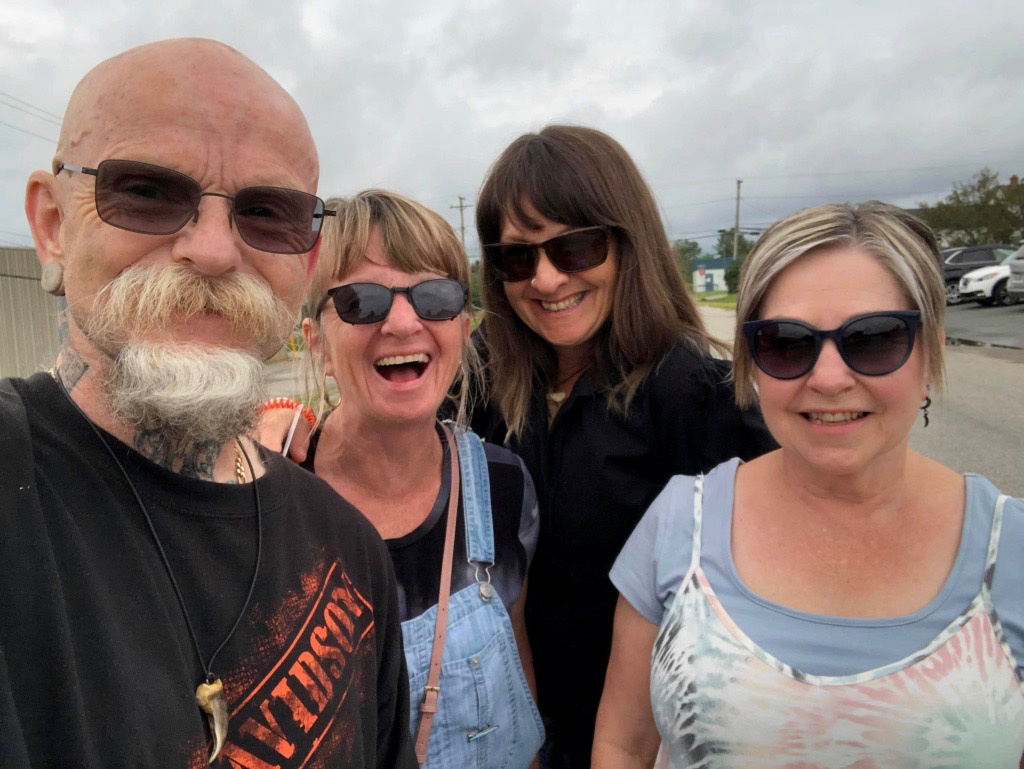
Knowing he was prone to relapses, I staunched expectations. But when I wasn’t looking, hope crept in. My big brother was seeking help. He was fighting to get well. That meant something. I was calling and texting him regularly, as were other family members across the country. During the pandemic, my sisters and I organized virtual cooking classes with Joe where we’d prepare a meal together. It was hilarious and therapeutic for all of us—and comforting to know Joe would have a few days’ worth of his favourite chickpea curry.
By mid-2021, he seemed to be considering a return to Alberta. He thrilled to the idea of riding his Triumph through the Rockies. But then he seemed hollowed out and paralyzed by the logistics of selling and buying a house and moving across the country. In an effort to lighten his load and show him what was possible, Helen and I spent a week at his house later that year, sorting through things to sell, donate, or toss. He was leaning heavily on THC, but as far as I could tell, he wasn’t drinking. I’d told him I wouldn’t come if he was.
Joe had a lot of random stuff. He scoured flea markets and garage sales for treasure—rare books for me, sewing gadgets for our seamstress sister Paula. One morning, he showed Helen and me a cigar box of antique pocket watches. “I always wanted to get ’em fixed up,” he told us. I said it wasn’t his job to care for them anymore—he had to take care of himself. He poked around the box a bit, then closed the lid and lowered it to the give-away pile. “You’re right.” Helen and I wide-eyed each other in an unspoken “Wow.” I turned away to hide tears.
After the funeral, Steven told me he never truly believed Joe would move back to Alberta. He said his dad preferred to conceal his uneven recovery in a far-flung bunker. It made me sad to hear him say it, but it had the ring of truth and I thought about it a lot. If so, then perhaps our housecleaning visit—a cherished memory for me—had made Joe feel like a fraud after we left. Because it’s always simpler to retreat into old stories than to write new ones. I think some of us can relate to that, myself included.
I visited Joe’s house one last time after the funeral, to collect his papers and family souvenirs. I turned on the radio to fill the silence with his favourite classic rock—Creedence, April Wine. I stepped broadly over the place where his body had been found and scolded him for stockpiling toys for the grandsons instead of visiting them. I filled my rental with remnants: hunting bow, Harley T-shirts, coin collection, green army socks and knives, leather jackets. On a final pass through, I grabbed bungee cords and tarps, still in their packages. He’d have been pissed if I hadn’t.
We all carry pain stories: what happened to us, what others did, what we should have done but didn’t. I took my pain story about Joe and pulled it apart to see what I could learn. I saw that love is not enough to fix someone—nothing is, not even time and its phony promise of healing wounds. Because no matter the depth of your trauma or injustice, nor the breadth of healing intervention, in the end, the repair work always comes down to you. This is totally unfair but true. I think Joe was figuring that out. I think, after decades of carrying pain stories around, he was learning how to put them down and repair himself.
That my big brother died too young was probably inevitable, given the ravages of addiction and our family’s history of heart disease. And you could say it’s tragic for a life to end in the midst of transformation. I prefer to say he died trying.
